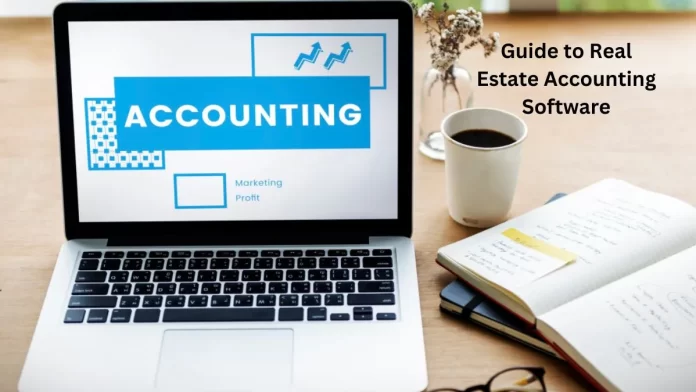Proper accounting practices are essential for real estate professionals to gain insights into their financial performance, prepare taxes, and make smart business decisions. But juggling the many financial tasks like tracking income and expenses can become an overwhelming challenge without the right real estate accounting software.
That’s where the focus keyword of this article comes in – “real estate accounting software.” Read on to learn the major benefits real estate accounting software provides, key features to look for, top programs on the market, implementation tips, and more. With the right accounting solution in place, real estate agents and investors can simplify their finances and set their business up for success.
Benefits of Real Estate Accounting Software
Real estate accounting software delivers a wide variety of advantages to professionals in the real estate industry. Making the switch from manual spreadsheets or old-school paper ledgers can save huge amounts of time and provide new levels of organization and insights. Here are some of the biggest reasons to use dedicated accounting software for your real estate business:
Save Time on Bookkeeping and Reconciliation
No one wants to spend hours entering transactions or chasing down receipts. Real estate accounting software automates much of the routine bookkeeping work, allowing you to focus on revenue-generating tasks. Features like transaction importing, automated categorization, and bank reconciliation can reduce the busywork.
Easy Generation of Financial Reports
Creating profit and loss statements and pulling tax documents used to be time-consuming manual processes. Real estate accounting programs can instantly generate customized financial reports with the latest figures. Review performance across any date range and export reports in seconds.
Organized Tracking of Income and Expenses
Staying on top of commissions, fees, association dues, marketing costs, and other real estate income and expenses is easier with dedicated accounting tools. Built-in categorization, labeling, and sorting features keep everything orderly.
Automated Reminders for Payments
Don’t miss a payment or let an invoice slip by. Accounting software can schedule automatic reminders for recurring payments and send invoice reminders when client payments are due. This automation prevents late fees and keeps cash flow consistent.
Integration with Bank Accounts and Credit Cards
Manually downloading transactions is an accounting headache. Real estate accounting software seamlessly syncs with business bank and credit card accounts to automatically import transactions. New charges and deposits show up in your system, ready for categorization.
Access Records Anytime, Anywhere
Cloud-based real estate accounting platforms allow access to your financial data 24/7 through any web browser or mobile app. You can monitor cash flow and pull reports whether you’re in the office, at a showing, or even on vacation.
Scalable as Business Grows
Startups need accounting just as much as established businesses. Choose real estate accounting software that can scale up as your company grows. The right program will provide all the features and capacity you need for higher transaction volumes without the need to keep switching platforms.
Related Article: How does Accounting Software Help to Manage your Financial Data Remotely?
Features to Look For
With an abundance of accounting software options available today, how do you choose the right solution for your real estate business? These key features can help narrow your search to find the best accounting software that matches your needs and expectations:
Cloud-Based Platform
Look for a real estate accounting program that is fully cloud-based. This allows access from anywhere and on any device. Cloud platforms also provide quick deployment without long setup and installation processes.
Customizable Dashboard
See all your important financial metrics and updates at a glance on a custom dashboard. Adjust widgets and preferences to view charts, calendars, reminders, and reports that are most useful to you.
Invoicing Capabilities
Easily create professional invoices, track payments, and automate reminders to get paid faster. Invoicing is crucial for collecting commission and property management fees.
Expense Tracking
Real estate involves a lot of varied expenses from marketing to transportation. Detailed expense tracking provides clarity on where money is going and helps maximize tax deductions.
Tax Planning Tools
Get more prepared for tax time with built-in tools that simplify depreciation, deductions, and other tax scenarios. Consult specialists for optimal filing.
Mobile App
Access your real estate accounting platform on the go via iOS and Android mobile apps. View reports and transactions and create invoices anywhere.
Advisory Resources
Look for advisory content, guides, blogs, and videos within software. Educational resources help you fully utilize platform features and learn accounting best practices.
Data Security
Cloud accounting platforms must provide robust data security including encryption, backups, and strict access controls. Your financial information stays private and protected.
Also Read: 5 Business Finance Tips To Help You Manage Your Money
Implementation Tips
Adopting new accounting software requires careful rollout and onboarding. Follow these best practices when getting started with real estate accounting software:
Set Up Chart of Accounts
Map your financial structure by establishing a chart of accounts with income, expense, asset, and equity categories. This helps transactions flow into proper places.
Link Bank Accounts
Connect business bank and credit card accounts so that transaction data flows into the accounting system automatically. Link investment accounts too.
Input Existing Data
Don’t start from scratch if you have existing financial data. Input historical transaction records, contact info, balances, etc. to retain context.
Set Up Recurring Transactions
Schedule regular repeating transactions like rent, subscriptions, payroll, etc. These repeat automatically on assigned dates.
Turn On Automated Backups
Enable auto-backup so your data is regularly backed up to the cloud. You can also manually back up any time.
Customize Reporting
Tailor reports and dashboards to showcase metrics you care most about. Adjust columns, time periods, formatting, and other preferences.
Take Training Tutorials
Make the most of your software’s features and tools by taking advantage of onboarding resources like demos, webinars, blogs, and help content.
Sync Calendar with Tasks and Due Dates
Connect your accounting calendar to show key deadlines and dates for invoices, payments, taxes, and reminders.
Go Paperless Scan, upload, or take photos of any necessary paper documentation to store digitally within the platform. Shred files afterwards.
Get Help from Customer Support
Reliable customer support via phone, email, chat, and ticketing systems ensures you don’t get stuck and questions get answered promptly.
Also Read: Apps That Help to Calculate Tax
Making the Switch
Transitioning accounting systems takes planning and discipline. Follow these tips for smoothly switching real estate accounting software with minimal disruption:
Decide on Ideal Software for Your Needs
Consider your must-have features, budget, and company size. Weigh pros and cons of top solutions. Sign up for free trials. Choose the best overall fit.
Don’t Try to Migrate Everything at Once
To prevent a rushed or chaotic transition, focus first on getting core functionality set up like bank syncs, dashboards, and categorization rules.
Export Old Data and Import into New System
Pull out old transaction records, client contact info, previous statements and import into the new platform. Retain history.
Run Both Systems Simultaneously at First
Keep the old system active for reference during the transition period. Double entry shows discrepancies and prevents data loss.
Determine Cutover Date and Stick to It
Establish a cutover date where the new system becomes the sole active platform. Disable old system access so it remains read-only.
Archive Old System as Reference
Keep the old accounting system as a searchable reference archive. Set access permissions to maintain separation from the new platform.
Also Read: 5 Tips to Protect Your Small Business
Conclusion
Real estate accounting software makes a world of difference for real estate professionals needing to simplify bookkeeping, gain business insights, and prepare for tax season. Cloud-based programs can automate routine accounting tasks, generate insightful reports, and provide reliability for smooth financial management. For long-term success, real estate businesses of any size benefit from incorporating dedicated accounting systems into their tech and processes.
FAQs
Is accounting software necessary for real estate investors?
Yes, having proper accounting software is highly recommended for all real estate investors. Keeping detailed records of property finances, expenses, profits/losses, and tax implications is enormously simplified with a cloud accounting platform designed for real estate.
What features should I look for in real estate accounting software?
Top features to have in real estate accounting software include cloud access, bank account integration, customizable dashboards, mobile apps, invoicing, expense tracking, reporting, data security, and special real estate tools for investment tracking and depreciation.






